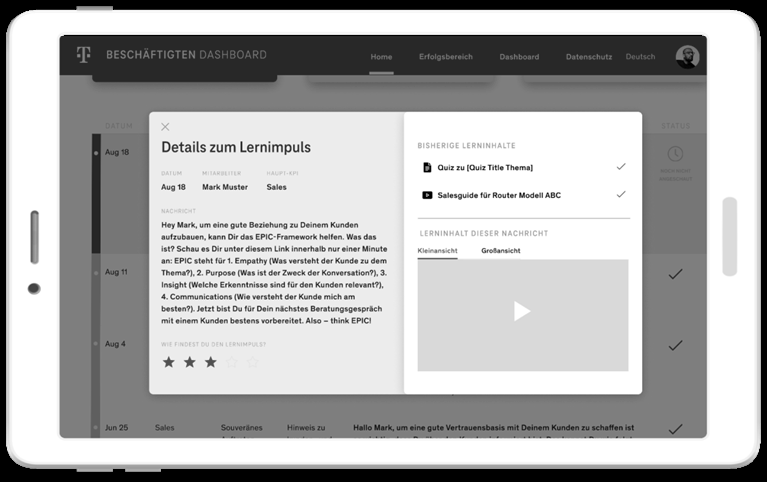On this page: Opportunity | Solution | Impact
The Opportunity
Giving individuals the skills they need, when they need them
Deutsche Telekom serves a vast customer base, including 23.5 million private customers, 2.4 million SMEs, and 300,000 organizations across Germany. With more than 15,000 call center agents and 5,500 field service agents on the ground, the telecom giant understood the importance and challenges behind ensuring the experience of each customer interaction is as efficient and focused as possible.
Leadership at Deutsche Telekom recognized that traditional learning programs were not built to effectively meet the individual needs of employees, resulting in too much variation in performance across service agents. This variability was having a ripple effect across customer experience, operational efficiency, and employee satisfaction.
They looked for a solution that would use advanced technology to transform how coaching was done across the organization — shifting from a reliance on supervisors’ individual coaching skills to a systematic and personalized approach capable of lifting everyone up across the organization.
“To go from being great at customer service to being excellent is very hard. To get there, Deutsche Telekom wanted to shift from standardized learning to offering lessons tailored to individual agent needs,” says McKinsey partner Nicolai von Bismarck. “The analogy would be going from having to search for YouTube fitness videos on your own to actually working with a personal trainer who guides you based on your individual needs.”
Finding a way to go from data to insight and actions was the big challenge we had to tackle.
Peter Meier van Esch, Deutsche Telekom SVP, Operational Excellence, Service Development, and Innovation
To achieve this vision at scale, Deutsche Telekom partnered with experts from QuantumBlack, AI by McKinsey, applying QuantumBlack’s proprietary frontline AI product to create a digital capability model that could be built, tested, and refined to meet Deutsche Telekom’s unique and individual employee needs. An emphasis was placed on rethinking how training could be most effectively done and scaled to every business unit across the organization—a transformation effort designed to help bridge silos across the company.
“We have an incredible wealth of information and resources available to help level the playing field when it comes to training agents and improving the customer experience,” says Deutsche Telekom Senior Vice President of Operational Excellence and Innovation, Peter Meier van Esch. “Finding a way to go from data to insight and actions was the big challenge we had to tackle—how to give each agent the training they need, ensure it’s effective, and build trust in change management across the organization.”
The Solution
Building an AI engine powered by millions of pieces of data
The undertaking began with a six-week diagnostic phase to identify key trends and set requirements needed to build a digital capability model. Huge amounts of data, including millions of pieces of call data, thousands of relevant field service data points, customer feedback, and KPIs were combined to identify individual skill gaps and provide tailored learning interventions.
In addition to building an advanced data model, another important element to the work involved spending time with agents to uncover and understand their individual needs firsthand. “We spent a lot of time with employees to understand what they did and didn’t like in the education process,” says McKinsey partner Julian Raabe. “We learned that while they had been given some time and budget to educate themselves, the repository of trainings contained thousands of pieces of material, which was far too much for them to navigate. They also didn’t like getting generic training.”
Next came a four-month MVP phase to build, test, and refine the digital-based learning and coaching engine that would power the hyper-personalized offerings. This work focused on developing a robust AI engine to identify key job families and make the skill-building process more transparent and personalized for employees. The engine provides greater transparency on performance and skill maturity so that supervisors can pick the right level of trainings for employees, offers personalized learning interventions, and monitors the impact on performance through KPIs, making adjustments as necessary.
“What we did here was bring together all the pieces of information that are available to everybody, but that nobody had enough time to actually digest because it was simply too much information,” says Deutsche Telekom Sales and Service Vice President of Lean and Digital Excellence Dominik Grafenhofer. “This approach creates much more fairness and removes biases, turning feedback from an art into a science by creating a plan, then measuring effectiveness to see if it actually works.”
Identifying the core material and knowledge needed in each customer interaction—be it a field visit or customer call—was the toughest and most crucial technological challenge the team had to solve for. To make the most of the data available in each service line and build a hyper-personalized solution for each type of customer interaction, data was fed into a custom-built AI engine that does a personal assessment of each service agent to identify specific needs and opportunities for learning.
To make this new training approach scalable across the company, the AI engine has been integrated into employees’ existing workflows through personal dashboards or “cockpits” that provide transparency into their skills and learning opportunities. These cockpits give users precise control and interaction with content, supported by a digital trainer, personal trainer, and tailored exercise routines. As part of an ongoing effort to build trust in this process to eventually fully automate it, supervisors now review and validate pieces of relevant training identified by the engine, which then get sent to employees’ personal dashboards.

Training modules and resources are delivered in real-time both out in the field and in the call center through a personalized dashboard that integrates learning into existing workflows.
ipad screen
The digital coach shares analytics via a user-friendly interface that also offers personalized training plans and timely nudges to help guide agents in the right direction. Like an Apple Watch or Fitbit that measures multiple triggers and responds with customized nudges, real-time data gathered throughout the day feed a training engine that then responds with the best-matched personalized actions verified by supervisors. These exercise routines are made up of a range of learning modalities to suit different learning styles and needs, including micro trainings, face-to-face and web-based training, and real-time support and learning interventions.
The engine is designed to measure and record which trainings work and don’t, tailoring future offerings based on these outcomes. As part of the shift in change management that this new process requires, team leads help reinforce learning priorities by offering ongoing coaching and making sure employees track their individual progress via the cockpit and find training materials useful.
Service line use cases
In its initial rollout phase, the engine was built to address the specific needs and challenges of two of Telekom’s most sprawling service lines: field agents and call centers. Below are more specifics on the approach taken to meet each business unit’s unique needs:
The Impact
Better customer outcomes and greater employee satisfaction
Deutsche Telekom’s digital-based learning and coaching engine has not only made the company more operationally efficient, it has also boosted customer satisfaction, as evidenced by a 14-point increase in customer likelihood to recommend the company to others.
Our employees are more confident and better equipped to handle customer interactions, which directly translates into higher customer satisfaction and loyalty.
Peter Meier van Esch, Deutsche Telekom SVP, Operational Excellence, Service Development, and Innovation
The learning engine has also given the company a more nuanced understanding of performance types and development needs, leading to more targeted and effective training programs, especially for average performers and those with growth potential. “This solution was designed to enable fast evolution to stay on the AI innovation curve,” says Urij. “AI’s speed of evolution is extreme and we must be able to plug and play cutting-edge technology to deliver maximum business value.”
Looking ahead, Deutsche Telekom plans to continue scaling the solution across its operations, including retail, back-office functions, and sales with a continued focus on change management and the goal of reaching more than 10,000 agents across the company.
On a fundamental level, this personalized approach has also helped transform the company culture into one of continuous learning and development. “The impact of this work has been profound,” says Peter. “Our employees are more confident and better equipped to handle customer interactions, which directly translates into higher customer satisfaction and loyalty.”
“Our firm is designed to operate as one—a single global partnership united by a strong set of values. We are equally committed to both sides of our mission: attracting and developing a talented and diverse group of colleagues and helping our clients create meaningful and lasting change.
From the C-suite to the front line, we partner with clients to help them innovate more sustainably, achieve lasting gains in performance, and build workforces that will thrive for this generation and the next.”
Please visit the firm link to site


